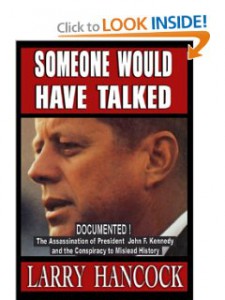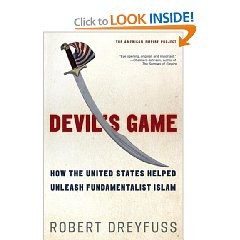
![]() Superb History, Highly Relevant to 9/11 and Lies by Cheney & Other Neocons
Superb History, Highly Relevant to 9/11 and Lies by Cheney & Other Neocons
September 5, 2007
Larry Hancock
EDIT of 7 Oct 09: MUST READ Review: JFK and the Unspeakable–Why He Died & Why It Matters
I've read one other book that led me to conclude that I had to read this one, both in relation to what is now known about the Warren Commission Report. I consider these important because precisely the same kind of cover-up happened with the 9-11 Commission, and I strongly believe that Dick Cheney should be impeached and then indicted along with Rudy Gulliani and Larry Silverstein and Donald Rumsfeld for the murder of thousands by controlled demolitions and a missile into the Pentagon that destroyed all the computers needed to understand the missing 2.3 trillion that Donald Rumsfeld was being grilled on by Congresswoman McKinney on 10 September.
This is a phenomenal piece of work that makes superb use of social network analysis (who knows who) to connect the dots.
The bottom line: Kennedy was killed by Cuban exiles who set Oswald up as a patsy. Oswald was at his usual lunchroom place in the library where he had reason to be, and the Chief of Police of Dallas is on record as saying they could never connect Oswald to either the window from which the shots were a llegedly fired, or the gun that was claimed to be the assassination weapon. The first officer to enter the building minutes after the shooting placed Osxwald at his usual place in the lunchroom, and Oswald tested negative for gunpowder residue.
Oswald was impersonated in Mexico City, including a staged call to the KGB specialist in assassination, and other trails were left with the intent of proving that Castro had Kennedy assassinated, and hoping to both punish Kennedy for the Bay of Pigs betrayal and for cracking down on Cuban exile missions at the same time that he was authorizing 13 sabotage missions to Cuba.
The evidence is compelling. Robert Kennedy was worried about Castro retaliating against him and his brother. It is now clear that CIA training of Cubans to assassinate Castro was in fact turned against Kennedy.
Three CIA employees are featured: David Philipps who specialized in the big lie; E. Howard Hunt, and David Morales, Operations Chief of JMWAVE under Ted Shackley.
The conspiracy to point the finger at Castro failed, but the true assasins were allowed to go undiscovered because Lyndon Johnson and the Presidents physician began am immediate cover-up, as did the FBI, CIA, and the Secret Service.
The book is compelling in demonstrating that ample warnings had been received by the Secret Service, to the point that the President was personally briefed by Bobby Kennedy, but JFK went ot his death on his own volition–he blew off the warnings.
The cover-ups by the three agencies bear a stricking resemblance to the cover-up of the Oklahmoa City bombing, where unexploded thermite bombs were found on some pillars, and the “loner” theory simply does not stand up. Similarly, Cheney, Gulliani, and Silverstein pre-arranged for the scooping and dumping of the evidence of controlled demolitions from 9-11, and Rumsfeld covered up the fact that a missile, not an airplane was targetted on the Pentagon by our own treasoous officers willing to obey an illegal order and murder their own for the Zionist-NeoCon cause, while also destroying the computers holding evidence of where the “lost 2.3 trillion dollars had gone.
The exiles boasted privately of having been promised additional new funding by the mafia, including the Jewish mafia with casino interests in Cuba, provided they took care of Kennedy and incited an invasion of Cuba.
It is not clear from the book if other US leaders sanctioned the killing. I am inclined to think not. Hoover had all the blackmail material he needed to keep his job. Johnson does not come into the picture until after t he fact, when it became clear that if Bobby Baker talked, Johnson would go to jail for blatant contacts with organized crime and for blatant use of his office to obtain bribes from military-industrial corporations.
In this book Ruby is a patsy paid to murder Oswald when Oswald is arrested and unable to make the theater meeting where he would probably have been subdued and transported to Cuba or Mexico to die under circumstances incriminating Castro. Ruby was probably told he would be freed or pardoned, and money was his primary motivation.
A series of key witnesses who were willing to talk were murdered, and Johnson personally immunized FBI agent Regis Kennedy, Oswald's handler, to keep him from talking.
Admiral Burkley, JFK's personal physician, handicapped and stopped most of the atopsy process, and concealed and manipulated evidence to support the lone gunman theory. The Navy hospital staff received a gag order similar to the one given the crew of the USS Liberty after they were deliberatedly attacked by Israel and many of them murdered by our so-called ally.
There are several take-away bottom lines relevant to today, as Dick Cheney seeks to attack Iran in the same illegal way he ordered the attack on Iraq using lies and his secret authority:
1) We cannot trust our elected politicians. They lie to us.
2) We cannot trust the FBI, CIA, or Secret Service. They lie to us.
3) We cannot trust government commissions, neither executive nor legislative, they are exercises in deception and lie to us.
The author is meticulous is documenting the long list of unsung heros whose personal research has over time brought out the truth. Similarly, I am quite certain that within five years Cheney, all the neocons, Gulliani, and Silverstein will be meticulously impeached and indicted and covicted in the public eye. They may escape to Dubai, but the truth will be known.
The book documents Johnson's offer of a $1 million bribe to Bobby Baker to keep quiet and allow the investigation to go down the path that Johnson orchestrated, of a Warren Commission brow-beaten into validating an FBI conclusion that was known to be false by all conceerned.
The books comes with great note and appendices. The author has made superb use of telephone records, diaries, and known social and professional connections. The only thing I missed from this was a two page diagram of the network as it is described.
The book is also exceptional for clearly identifying additional paths for further investigation.
I put the book down with the strong feeling that We the People need to reject every sitting member of Congress and every current candidate for President. We need to elect a transpartisan Executive team with a Cabinet announced beforehand that also publishes a balanced sustainable budget before election day, and we need to demand that every piece of legilsation henceforth be published in full one week prior to its being voted on, with no secret earmarks. The military-industrial complex is not our enemy–they are simply doing what they have been incentivized to do. Our enemy is the complete corruption of the Democratic and Republican parties, the complete corruption of our election system, and the lack of transparency on how all taxpayer funds are spent. We can fix this. A good start would be the redirection of half the Pentagon budget toward waging peace, ending our ties with all 42 of the dictators Dick Cheney embraces with such fervor, and the elimination of two thirds of all existing secret programs, using the funds instead to stand up a Multinational Information Sharing Activity that supports stabilization, reconstruction, and peacekeeping everywhere, and completely free connectivity for the five billion poor to a global network of 100 million volunteer tutors who can teach the five billion “one cell call at a time.”
Some other books I recommend that tie this one to today's events and the pattern of lies, lies, and more lies:
A Farewell to Justice: Jim Garrison, JFK's Assassination, And the Case That Should Have Changed History
Vice: Dick Cheney and the Hijacking of the American Presidency
The One Percent Doctrine: Deep Inside America's Pursuit of Its Enemies Since 9/11
Debunking 9/11 Debunking: An Answer to Popular Mechanics and Other Defenders of the Official Conspiracy Theory
9/11 Synthetic Terror: Made in USA, Fourth Edition
Crossing the Rubicon: The Decline of the American Empire at the End of the Age of Oil
American Fascists: The Christian Right and the War On America
Weapons of Mass Deception: The Uses of Propaganda in Bush's War on Iraq
Lost History: Contras, Cocaine, the Press & ‘Project Truth'
Fog Facts : Searching for Truth in the Land of Spin (Nation Books)










